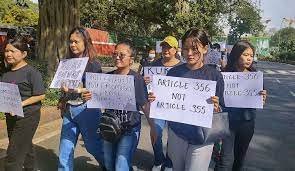In a recent development in Manipur, a peace committee constituted by the Centre has faced a major setback as most Kuki representatives have decided to boycott the panel. The primary reason cited by the Kuki representatives is the inclusion of Chief Minister N. Biren Singh and his supporters in the committee. They assert that their consent was not sought before including these members, and they are now demanding that the Centre takes appropriate measures to create a conducive environment for meaningful talks.
The formation of the peace committee by the Centre was seen as a positive step towards resolving the long-standing conflicts and fostering peace in Manipur. However, the inclusion of Chief Minister N. Biren Singh and his supporters has raised concerns among the Kuki representatives. They perceive this move as biased and believe that the committee may not provide a fair platform for addressing the grievances and concerns of all parties involved.
The Kuki representatives argue that their exclusion from the decision-making process undermines the spirit of inclusivity and compromises the credibility of the committee. They assert that for the peace committee to be effective, it should have representation from all relevant stakeholders and ensure that diverse perspectives are taken into account. By neglecting to consult the Kuki representatives, the Centre has inadvertently sparked discontent and hindered the prospects of meaningful dialogue.
In response to this situation, the Kuki representatives have taken a unified stance to boycott the peace committee until their concerns are addressed. They emphasize the importance of fairness and transparency in the peace-building process and demand that the Centre rectifies the composition of the committee. By doing so, they believe that the committee will gain the trust and confidence of all parties, thereby increasing the likelihood of successful negotiations.
Furthermore, the Kuki representatives call upon the Centre to create a conducive environment for dialogue. They argue that without addressing the underlying issues that have led to conflicts in Manipur, any peace initiative is likely to be ineffective. They highlight the need for a comprehensive approach that takes into account the historical, social, and economic factors contributing to the tensions in the region. By addressing these root causes, the Centre can lay the foundation for sustainable peace and development in Manipur.
The boycott by the Kuki representatives poses a significant challenge to the peace committee’s effectiveness and underscores the importance of inclusivity and consensus-building in such processes. The Centre must recognize the grievances of the Kuki community and engage in open and transparent dialogue to address their concerns. It is crucial for all parties involved to come together, with mutual respect and understanding, to find lasting solutions to the conflicts in Manipur.
The decision of most Kuki representatives to boycott the peace committee in Manipur due to the inclusion of Chief Minister N. Biren Singh and his supporters has highlighted the need for inclusivity and transparency in the peace-building process. The Centre must take immediate steps to address the concerns raised by the Kuki representatives and create an environment conducive to meaningful dialogue. Only through an inclusive and comprehensive approach can lasting peace and development be achieved in Manipur.







